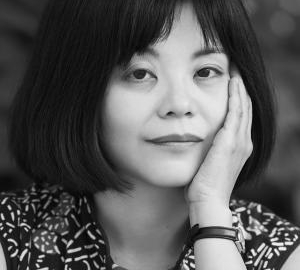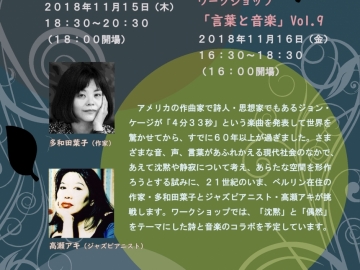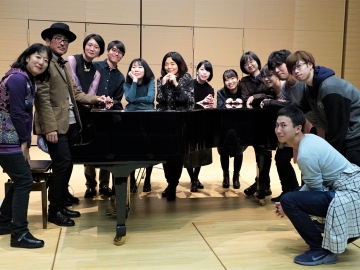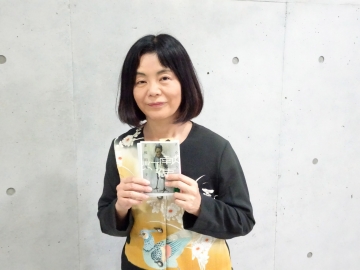This year marks the fourth year of the Tawada Yoko Academic Workshop. In 2021, mostly by graduate students, there were many ambitious presentations and reports to serve the purpose of sharing and updating research findings on Tawada’s literature. Under the spread of the novel coronavirus infection, the workshop was held via ZOOM, and researchers from various locations were able to participate. Yoko Tawada also participated as a commentator. After an explanation for the purpose of the workshop by Professor Miho Matsunaga of Waseda University’s Faculty of Letters, Arts and Sciences, who has long held workshops with Yoko Tawada, three graduate students presented their research.
First, Kanoko Segawa, a master’s student of the Contemporary Literature Course under the University’s Graduate School of Letters, Arts and Sciences, gave a presentation entitled “‘Opium for Ovid’ Confronting ‘Metamorphoses’.” Comparing Ovidius’s “Metamorphoses” and Yoko Tawada’s “Opium for Ovid,” the presentation rethought “Opium for Ovid” as a novel resistive to “Metamorphoses” completed in the Roman era. The presentation also had important perspectives in terms of adaptation. Of particular interest was the interpretation of Tawada’s use of language focusing on nation and ethnicity as metamorphosis resistive to be colonially named and dominated.
Next, Ryosuke Tomidokoro, a master’s student of the same Contemporary Literature Course gave a presentation entitled “Drawing a Constellation of Stones: On the Theme of the Poetry Collection ‘Steine’.” The presentation compared Tawada’s poetry collection “Steine” (Seidosha, 2017) with another collection, “Kasa no shintai to watashi no tsuma” (Shichosha, 2006) to get an overall picture of the former. In “Steine,” the first person “I” and the second person “you” fluctuate and do not form a single narrative, whereas, in “Kasa no shintai to watashi no tsuma,” we can read a kind of story with critical words reminding us of real social problems. With the word “steine” evoking syutai (subject), shitai (corpse), shitai (want to do), the linkage of words becomes a poetic language. It was a powerful presentation focusing on Tawada’s poetry collection.
Lastly, Seungyeon Kim, a doctoral student at Ritsumeikan University, gave a presentation titled “Present Place of ‘Exophony’: The Distance between Tawada’s Literature and Korean, or Translation and World Literature.” Focusing on the chapter “Seoul” from Tawada’s collection of essays “Exophony,” the presentation pointed out that Tawada has focused on exophony forcing to go outside one’s mother tongue from the beginning, and interpreted this as an indication that researchers, even nowadays, should not emphasize only the optimistic aspect of the word exophony. The presentation also raised significant questions about current literary studies, in which concepts such as “world literature” are accepted as somewhat “universal.”
The following left an impression in Yoko Tawada’s comments. For Segawa’s presentation, Tawada clarified the critical inheritance of “Metamorphoses” and her recognition that humans basically metamorphose, with an accessible indication that metamorphosis is a basic movement including the fluctuation between two sexes, or the change of the body as we age. For Tomidokoro’s presentation, Tawada said that we sometimes perceive language and things as something unfluctuant; but as soon as we say a word, things start to fluctuate, move, and talk by themselves. Unexpectedly, the image of fluctuation overlapped with Segawa’s presentation. For Kim’s presentation, Tawada said that the presentation was consideration about the relationship between theory and literature in a larger sense. An aggregated single theory may result in an aggregated single ideology or thought. However, theory and literary studies can break down or unravel such a single ideology. The term “exophony” is widely accepted, whereas the importance of reexamining the negative aspects of the word “exophony” and the division between inside and outside was discussed in the Q&A session with the floor.
The workshop also featured a report on the doctoral dissertation of Yumiko Saito (visiting researcher at Meiji University), who completed her doctoral dissertation in Germany on Yoko Tawada. Interestingly, Saito connected Tawada’s literature with Walter Benjamin’s thought in the ambitious dissertation. Benjamin’s essays are often referred to or interpreted from a point of view of linguistic philosophy, while this thesis raises the perspective that translation is possible only in the language of poetry, and explores the roots of translation. The report gave us a glimpse of this.
There were about 20 participants: graduate students from both Waseda and other universities, as well as faculty members and researchers from various universities, both within Japan and overseas. With the extended Q&A session, the workshop was a very productive experience.
Workshop Overview
Date and time: November 23, 2021 (Tue), 19:00 – 21:00
Workshop was held online (Berlin and Tokyo)
Commentator: Yoko Tawada
Moderator: Arisa Iwakawa (Associate Professor, Waseda University)
Guest speaker: Yumiko Saito (Visiting Scholar, Meiji University)








